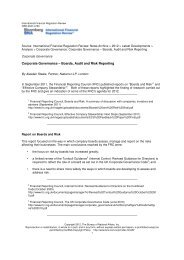When the regulator knocks, will you be ready? - Nabarro
When the regulator knocks, will you be ready? - Nabarro
When the regulator knocks, will you be ready? - Nabarro
You also want an ePaper? Increase the reach of your titles
YUMPU automatically turns print PDFs into web optimized ePapers that Google loves.
<strong>When</strong> <strong>the</strong> <strong>regulator</strong> <strong>knocks</strong>, <strong>will</strong> <strong>you</strong> <strong>be</strong> <strong>ready</strong> Survey 2008<br />
REPORT<br />
<strong>When</strong> <strong>the</strong> <strong>regulator</strong> <strong>knocks</strong>,<br />
<strong>will</strong> <strong>you</strong> <strong>be</strong> <strong>ready</strong><br />
Survey 2008
Executive summary<br />
More than half of <strong>the</strong> respondents to our survey were not aware that<br />
<strong>the</strong>ir businesses were regulated by <strong>the</strong> Environment Agency, <strong>the</strong> Office<br />
of Fair Trading or <strong>the</strong> Pensions Regulator, despite <strong>the</strong> fact that all of <strong>the</strong>se<br />
watchdogs have jurisdiction over every company operating in <strong>the</strong> UK.<br />
Fur<strong>the</strong>rmore, a significant proportion of those surveyed did not realise that<br />
<strong>the</strong> European Commission and <strong>the</strong> Health and Safety Executive had powers<br />
over <strong>the</strong>ir activities.<br />
Despite this apparent ignorance, 87% of <strong>the</strong> individuals we questioned agreed<br />
that <strong>the</strong> level of regulation and scrutiny facing <strong>the</strong>ir companies had increased<br />
over <strong>the</strong> last five years, often resulting in heightened workloads and a greater<br />
administrative burden <strong>be</strong>cause of tighter controls on internal procedures.<br />
The responsibility for dealing with <strong>the</strong> reputational risks posed by <strong>the</strong><br />
<strong>regulator</strong>s falls to <strong>the</strong> main board at 67% of <strong>the</strong> companies in our poll, and<br />
in <strong>the</strong> vast majority of cases, those responsibilities are never shared with<br />
o<strong>the</strong>r mem<strong>be</strong>rs of <strong>the</strong> business through training sessions. In all 70% of those<br />
interviewed said that <strong>the</strong>y had never run a training programme for <strong>the</strong>ir staff<br />
on diversity matters – despite <strong>the</strong> fact that employment tribunals have powers<br />
to hand out unlimited fines for discrimination cases – and 69% had never<br />
trained employees on environmental regulations.<br />
Therefore, whilst <strong>the</strong>re is a general appreciation of <strong>the</strong> increasing impact<br />
of <strong>regulator</strong>y bodies, it is clear that in most companies <strong>the</strong>re is a limited<br />
understanding of compliance obligations, and staff across <strong>the</strong> wider<br />
organisation are rarely kept abreast of <strong>regulator</strong>y responsibilities.<br />
This survey was carried out in 2007. A total of 70 telephone interviews were<br />
conducted with senior professionals in a range of listed companies, private<br />
firms and financial institutions operating in <strong>the</strong> UK.
<strong>When</strong> <strong>the</strong> <strong>regulator</strong> <strong>knocks</strong>, <strong>will</strong> <strong>you</strong> <strong>be</strong> <strong>ready</strong> Survey 2008<br />
“Our experience has shown that <strong>the</strong> rapid increase in<br />
regulation - and consequent increase in <strong>the</strong> exposure to<br />
reputational and <strong>regulator</strong>y risk - is one of <strong>the</strong> biggest<br />
worries for our clients. Maximising awareness and<br />
minimising risk is <strong>the</strong>refore paramount.”<br />
Jonathan Warne, Head of Dispute Resolution<br />
1<br />
What is <strong>you</strong>r role<br />
Corporate finance director 14%<br />
Head of legal/general counsel<br />
13%<br />
Managing director<br />
10%<br />
Director<br />
Manager<br />
7%<br />
7%<br />
Corporate finance executive<br />
CEO<br />
Compliance manager/director<br />
6%<br />
6%<br />
6%<br />
Fund manager<br />
Legal adviser<br />
4%<br />
4%<br />
CFO<br />
Company secretary<br />
Partner<br />
3%<br />
3%<br />
3%<br />
O<strong>the</strong>r<br />
14%<br />
5% 10% 15%<br />
2<br />
Do <strong>you</strong> think <strong>the</strong> level of regulation<br />
and scrutiny has increased over <strong>the</strong><br />
last five years<br />
Yes<br />
No<br />
9%<br />
87%<br />
Don’t know<br />
4%<br />
20% 40% 60% 80% 100%<br />
The vast majority of our respondents – 87% – <strong>be</strong>lieve that regulation and<br />
scrutiny has increased for <strong>the</strong>ir businesses in <strong>the</strong> last five years. <strong>When</strong> asked to<br />
go into more detail about how this shift impacts <strong>the</strong>ir daily pressures, 15 of<br />
those that we surveyed said that <strong>the</strong>ir workloads have increased as a result,<br />
particularly in terms of administrative demands.<br />
O<strong>the</strong>rs pointed to changes that included <strong>the</strong> greater monetary cost of<br />
compliance, <strong>the</strong> need for tighter controls of internal procedures, additional<br />
administrative costs and more bureaucracy across <strong>the</strong> board.
3<br />
Which of <strong>the</strong> following <strong>regulator</strong>y<br />
authorities is <strong>you</strong>r business subject to<br />
Health and Safety Executive<br />
76%<br />
Financial Services Authority<br />
62%<br />
European Commission<br />
The Pensions Regulator<br />
The Environment Agency<br />
Office of Fair Trading<br />
The Takeover Panel<br />
51%<br />
49%<br />
44%<br />
39%<br />
37%<br />
Sector <strong>regulator</strong> eg. OFCOM<br />
7%<br />
10%<br />
20%<br />
30%<br />
40%<br />
50%<br />
60%<br />
70%<br />
80%<br />
This table shows <strong>the</strong> percentage of our respondents who <strong>be</strong>lieved that <strong>the</strong>ir<br />
businesses were subject to regulation by each of <strong>the</strong> watchdogs mentioned.<br />
In fact, most of <strong>the</strong> companies interviewed, and <strong>the</strong> majority of companies<br />
operating in this country, are subject to scrutiny from all of <strong>the</strong> bodies<br />
identified, with <strong>the</strong> exception of <strong>the</strong> Financial Services Authority, which only<br />
regulates providers of financial services and o<strong>the</strong>r sector-specific <strong>regulator</strong>s.<br />
“Our clients are aware that <strong>regulator</strong>s exist and that<br />
<strong>the</strong>y are important, but it is impossible for any one<br />
person to understand <strong>the</strong> full range of <strong>the</strong> <strong>regulator</strong>s<br />
and <strong>the</strong>ir powers.”<br />
Rob Moulton, Financial Services Partner
<strong>When</strong> <strong>the</strong> <strong>regulator</strong> <strong>knocks</strong>, <strong>will</strong> <strong>you</strong> <strong>be</strong> <strong>ready</strong> Survey 2008<br />
Who are <strong>the</strong> <strong>regulator</strong>s<br />
The Health and Safety<br />
Executive<br />
The Health and Safety Commission is<br />
responsible for health and safety<br />
regulation in Great Britain. The<br />
Health and Safety Executive (HSE)<br />
and local government are enforcing<br />
authorities who work in support of<br />
<strong>the</strong> Commission.<br />
The HSE’s mission is to protect<br />
people’s health and safety by<br />
ensuring risks in <strong>the</strong> workplace are<br />
properly controlled. It looks after<br />
health and safety in nuclear<br />
installations and mines, factories,<br />
farms, hospitals and schools, offshore<br />
gas and oil installations, <strong>the</strong> safety of<br />
<strong>the</strong> gas grid and <strong>the</strong> movement of<br />
dangerous goods and substances and<br />
many o<strong>the</strong>r aspects of <strong>the</strong> protection<br />
of both workers and <strong>the</strong> public. Local<br />
authorities are responsible to HSC for<br />
enforcement in offices, shops and<br />
o<strong>the</strong>r parts of <strong>the</strong> service sector.<br />
The Financial Services<br />
Authority<br />
The FSA is an independent<br />
organisation responsible for<br />
regulating financial services in <strong>the</strong> UK.<br />
It was set up by government, and <strong>the</strong><br />
government is responsible for <strong>the</strong><br />
overall scope of <strong>the</strong> FSA’s <strong>regulator</strong>y<br />
activities and for its powers.<br />
The FSA regulates most financial<br />
services markets, exchanges and<br />
firms. It sets <strong>the</strong> standards that <strong>the</strong>y<br />
must meet and can take action<br />
against firms if <strong>the</strong>y fail to comply.<br />
The European Commission<br />
The European Commission is <strong>the</strong><br />
executive branch of <strong>the</strong> European<br />
Union. It is a cabinet of 27<br />
Commissioners who are responsible<br />
for proposing legislation,<br />
implementing decisions, upholding<br />
<strong>the</strong> EU’s treaties and <strong>the</strong> general dayto-day<br />
running of <strong>the</strong> EU. It is <strong>the</strong><br />
only European body capable of<br />
initiating new laws, and once<br />
legislation is passed, it is <strong>the</strong><br />
Commission’s responsibility to ensure<br />
it is implemented.<br />
The Pensions Regulator<br />
The Pensions Regulator is <strong>the</strong> UK<br />
<strong>regulator</strong> of work-based pensions<br />
schemes, with <strong>the</strong> specific objectives<br />
of protecting <strong>the</strong> <strong>be</strong>nefits of<br />
mem<strong>be</strong>rs of <strong>the</strong>se schemes;<br />
promoting good administration of<br />
work-based pensions schemes; and<br />
reducing <strong>the</strong> risk of situations arising<br />
that may lead to claims for<br />
compensation from <strong>the</strong> Pension<br />
Protection Fund.<br />
The <strong>regulator</strong> oversees schemes<br />
ra<strong>the</strong>r than employers, but its<br />
coverage includes most employers<br />
with at least five employees. Workbased<br />
pension schemes include any<br />
scheme that an employer makes<br />
available to employees, including<br />
occupational schemes, any personal<br />
pension schemes where employees<br />
have direct payment arrangements,<br />
and any stakeholder schemes.<br />
The Environment Agency<br />
The Environment Agency is <strong>the</strong> public<br />
body responsible for protecting and<br />
improving <strong>the</strong> environment in<br />
England and Wales. Its job is to make<br />
sure that air, land and water are<br />
looked after by everyone, and every<br />
year it brings hundreds of cases<br />
against companies and individuals<br />
that don’t take <strong>the</strong>ir environmental<br />
responsibilities seriously.<br />
The Office of Fair Trading<br />
The OFT is <strong>the</strong> UK’s consumer and<br />
competition authority, responsible<br />
for making sure markets work well for<br />
consumers. It does this by<br />
encouraging businesses to comply<br />
with competition and consumer law,<br />
and to improve <strong>the</strong>ir trading practices<br />
through self regulation; acting<br />
decisively to stop hardcore or flagrant<br />
offenders; studying markets and<br />
recommending action where<br />
required; and empowering consumers<br />
with <strong>the</strong> knowledge to make<br />
informed choices.<br />
The Takeover Panel<br />
The Panel is an independent body set<br />
up to administer <strong>the</strong> City Code on<br />
Takeovers and Mergers, and to<br />
supervise and regulate takeovers and<br />
o<strong>the</strong>r matters to which <strong>the</strong> Code<br />
applies. Its central objective is to<br />
ensure fair treatment of all<br />
shareholders in takeover bids.<br />
The Code applies to all offers for<br />
companies that have <strong>the</strong>ir registered<br />
offices – and <strong>the</strong>ir securities<br />
admitted to trading on a regulated<br />
market – in <strong>the</strong> UK, <strong>the</strong> Channel<br />
Islands or <strong>the</strong> Isle of Man.<br />
It also applies to private companies in<br />
certain circumstances, such as if any<br />
of <strong>the</strong>ir securities have <strong>be</strong>en admitted<br />
to <strong>the</strong> Official List at any time in <strong>the</strong><br />
ten years prior to <strong>the</strong> offer; or if<br />
dealings in <strong>the</strong>ir securities have <strong>be</strong>en<br />
published on a regular basis in <strong>the</strong><br />
preceding decade.<br />
The Code covers companies with<br />
registered offices in <strong>the</strong> UK and<br />
securities trading on regulated<br />
markets in one or more European<br />
mem<strong>be</strong>r states; companies with<br />
registered offices in ano<strong>the</strong>r mem<strong>be</strong>r<br />
state whose securities are admitted<br />
to trading only in <strong>the</strong> UK and, in<br />
certain cases, to companies with<br />
registered offices in o<strong>the</strong>r mem<strong>be</strong>r<br />
states whose securities are traded on<br />
exchanges in more than one mem<strong>be</strong>r<br />
state, but not on a regulated market<br />
in <strong>the</strong> mem<strong>be</strong>r state where <strong>the</strong>y have<br />
a registered office.<br />
Sector <strong>regulator</strong>s<br />
These include <strong>the</strong> communications<br />
<strong>regulator</strong> OFCOM, <strong>the</strong> water<br />
<strong>regulator</strong> OFWAT, The Office of Gas<br />
and Electricity Markets (OfGEM),<br />
The Office for Standards in<br />
Education (OFSTED), and <strong>the</strong> Office<br />
of Rail Regulation (ORR). Each has<br />
statutory powers to regulate<br />
participants in <strong>the</strong> industries for<br />
which it takes responsibility.
4<br />
Have <strong>you</strong> undertaken training in <strong>the</strong><br />
following areas<br />
70%<br />
60%<br />
50%<br />
40%<br />
30%<br />
20%<br />
10%<br />
10% 11%11% 68%<br />
10% 10% 10%<br />
70%<br />
69%<br />
32% 31%<br />
22%<br />
11% 15%<br />
9% 11%<br />
In <strong>the</strong> last 6 months<br />
In <strong>the</strong> last year<br />
More than a year ago<br />
Never<br />
43%<br />
13%<br />
10%<br />
34%<br />
60%<br />
18%<br />
10% 12%<br />
Competition<br />
Diversity<br />
Environment<br />
Health & Safety<br />
Money laundering<br />
Pensions<br />
Aside from <strong>the</strong> areas of health and safety and money laundering, in all o<strong>the</strong>r<br />
cases over 60% of our respondents had never trained <strong>the</strong>ir staff about<br />
compliance with <strong>regulator</strong>y responsibilities. This is despite potentially ruinous<br />
penalties and reputational risks posed by failure to comply with <strong>the</strong> watchdogs.<br />
To illustrate <strong>the</strong> penalties of non-compliance - and <strong>the</strong>refore <strong>the</strong> importance<br />
of getting it right - on <strong>the</strong> opposite page are a few examples of recent<br />
enforcement actions.
<strong>When</strong> <strong>the</strong> <strong>regulator</strong> <strong>knocks</strong>, <strong>will</strong> <strong>you</strong> <strong>be</strong> <strong>ready</strong> Survey 2008<br />
ENFORCEMENT ACTION<br />
Competition<br />
The potential penalties for non-compliance with UK and EU competition laws<br />
include fines of up to 10% of annual group turnover; invalidity of agreements;<br />
damages claims; personal fines and imprisonment for individuals involved in<br />
cartels, in some cases; and company directors can <strong>be</strong> disqualified.<br />
Diversity<br />
If an employer loses an unfair dismissal case at an employment tribunal, an<br />
order can <strong>be</strong> made for re-instatement of <strong>the</strong> claimant, re-engagement on<br />
similar terms or financial compensation. Financial compensation is by far <strong>the</strong><br />
most common, and <strong>the</strong>re are no limits on <strong>the</strong> amounts that tribunals can<br />
award in cases of discrimination. Employers have <strong>be</strong>en advised to streng<strong>the</strong>n<br />
anti-discrimination and equality policies following large awards.<br />
Environment<br />
The courts are taking environmental damage more seriously. In <strong>the</strong>ir 2006<br />
environmental performance review <strong>the</strong> Environment Agency reported that<br />
successful prosecutions against companies totalled over £3.5 million in fines<br />
(with an average of £11,800) compared to £2.7 million in 2005 (with an<br />
average of £8,600). The biggest offender was Thames Water, which was fined<br />
£191,600 for 15 events.<br />
In all, 380 individuals were prosecuted, including 29 company directors. Six<br />
directors were fined £5,000 or more and five received o<strong>the</strong>r penalties, including<br />
two custodial sentences totalling 14 months.<br />
Pensions<br />
The Pensions Regulator has <strong>the</strong> power to investigate schemes, require<br />
remedial steps to <strong>be</strong> taken and act against employers who seek to sidestep<br />
<strong>the</strong>ir pension obligations. The watchdog has <strong>the</strong> power to take action, on<br />
<strong>be</strong>half of a scheme, to recover unpaid contributions from <strong>the</strong> employer, freeze<br />
or wind-up a scheme, prohibit trustees from acting where considered unfit,<br />
impose fines, and prosecute certain offences in criminal courts.<br />
In particular, if <strong>the</strong> <strong>regulator</strong> <strong>be</strong>lieves an employer is deli<strong>be</strong>rately trying to avoid its<br />
pensions obligations, it can issue Contribution notices, requiring a specified amount<br />
to <strong>be</strong> paid into <strong>the</strong> scheme; Financial support directions, which require financial<br />
support to <strong>be</strong> put in place for an underfunded scheme; or Restoration orders, which<br />
mean that if <strong>the</strong>re has <strong>be</strong>en a transaction at an undervalue involving <strong>the</strong> scheme’s<br />
assets, <strong>the</strong> <strong>regulator</strong> can take action to have assets restored to <strong>the</strong> scheme.
“Many <strong>regulator</strong>s have a broad armoury of powers to search premises and<br />
take away documents. In some cases, it is a criminal offence to fail to cooperate<br />
with an investigation. Companies are <strong>the</strong>refore well advised to develop<br />
proper internal procedures to ensure that staff are aware of <strong>the</strong>ir rights and<br />
obligations in <strong>the</strong>se situations.”<br />
Cyrus Mehta, EU/Competition Partner<br />
5<br />
Who within <strong>you</strong>r business has<br />
primary responsibility for managing<br />
reputational risks posed by<br />
<strong>regulator</strong>s<br />
70%<br />
60%<br />
50%<br />
40%<br />
30%<br />
67%<br />
20%<br />
10%<br />
The main<br />
board<br />
16%<br />
10%<br />
Head of<br />
legal<br />
Dedicated<br />
board director<br />
4% 2% 1%<br />
CEO<br />
Managing<br />
director<br />
O<strong>the</strong>r<br />
6<br />
Do <strong>you</strong> have internal procedures for<br />
<strong>regulator</strong>y crisis management<br />
90%<br />
80%<br />
70%<br />
86%<br />
60%<br />
50%<br />
40%<br />
30%<br />
20%<br />
10%<br />
9%<br />
5%<br />
Yes No Don’t know<br />
Whilst many of <strong>the</strong> companies we surveyed did not have training<br />
programmes in place, <strong>the</strong> vast majority – 86% – do have policies set up to<br />
deal with <strong>regulator</strong>y crisis management. The management responsibilities<br />
for dealing with <strong>the</strong> reputational risks inherent in dealings with <strong>the</strong> <strong>regulator</strong><br />
generally sit at board level, which is a reflection of <strong>the</strong> importance attached<br />
to such matters.
<strong>When</strong> <strong>the</strong> <strong>regulator</strong> <strong>knocks</strong>, <strong>will</strong> <strong>you</strong> <strong>be</strong> <strong>ready</strong> Survey 2008<br />
Case study<br />
Corus fined £1.3m by<br />
<strong>the</strong> Health and Safety<br />
Executive<br />
In Decem<strong>be</strong>r 2006, <strong>the</strong> steelmaker Corus was fined £1.3m and ordered to<br />
pay costs of £1.7m by <strong>the</strong> HSE following <strong>the</strong> deaths of three workers in 2001<br />
from a blast furnace explosion at <strong>the</strong> company’s Port Talbot site.<br />
Corus pleaded guilty <strong>be</strong>fore Swansea Crown Court to two charges of failing<br />
to ensure <strong>the</strong> safety of its employees and o<strong>the</strong>rs, brought by <strong>the</strong> HSE under<br />
<strong>the</strong> Health and Safety at Work Act 1974.<br />
Case study<br />
Financial Services<br />
Authority<br />
The Financial Services Authority has regularly used its disciplinary powers to “name<br />
and shame” well-known players in <strong>the</strong> UK financial services sector. FSA investigations<br />
take up a significant amount of management time, and can cause serious<br />
reputational damage. FSA has recently made it clear that it intends to make increased<br />
use of its criminal powers, as well as its administrative ones. In Octo<strong>be</strong>r 2007,<br />
Margaret Cole, Director of Enforcement, said “We recognise that effective deterrence<br />
involves ensuring both people fear <strong>be</strong>ing caught and that <strong>the</strong>y fear <strong>the</strong> consequences<br />
of <strong>be</strong>ing caught, with <strong>the</strong> risk of custodial sentences playing a real part”.<br />
Case study<br />
ThyssenKrupp fined<br />
€479m by <strong>the</strong> European<br />
Commission<br />
In February 2007, <strong>the</strong> German conglomerate ThyssenKrupp was fined over €479m<br />
for its role in a price fixing scandal, which saw <strong>the</strong> Commission hand down fines<br />
worth a total of €992m to companies involved. The cartel operated <strong>be</strong>tween<br />
1995 and 2004. In this time mem<strong>be</strong>rs rigged tender prices, shared markets and<br />
exchanged confidential information .<br />
ThyssenKrupp was found to <strong>be</strong> a repeat offender, and its fine was increased by 50%.<br />
The fines are <strong>the</strong> largest ever fines imposed by <strong>the</strong> Commission for cartel violations.<br />
Case study<br />
Argos fined £15m by <strong>the</strong><br />
Office of Fair Trading<br />
In Octo<strong>be</strong>r 2006, <strong>the</strong> Court of Appeal upheld an OFT decision relating<br />
to price fixing in <strong>the</strong> toys and games market. Argos and Littlewoods were<br />
both found guilty in 2003 of entering into agreements to fix <strong>the</strong> prices of<br />
Hasbro toys and games <strong>be</strong>tween 1999 and 2001; Argos was fined £15m and<br />
Littlewoods ordered to pay £4.5m.<br />
Hasbro was granted full leniency <strong>be</strong>cause it provided <strong>the</strong> evidence that initiated<br />
<strong>the</strong> investigation, and <strong>the</strong>refore had its potential £15.6m penalty waived.
7<br />
Have <strong>you</strong> <strong>be</strong>en investigated by a<br />
<strong>regulator</strong> (apart from routine visits) in<br />
<strong>the</strong> last 12 months<br />
90%<br />
80%<br />
70%<br />
60%<br />
50%<br />
40%<br />
30%<br />
86%<br />
20%<br />
10%<br />
4%<br />
10%<br />
Yes No Don’t know<br />
Only 4% of our respondents had <strong>be</strong>en investigated by a <strong>regulator</strong> in <strong>the</strong> last<br />
12 months and those investigations had <strong>be</strong>en conducted by <strong>the</strong> European<br />
Commission, <strong>the</strong> Financial Services Authority or Ofcom. However, despite<br />
<strong>the</strong> fact that <strong>the</strong> majority of respondents have not yet had a personal<br />
experience of a formal investigation, <strong>the</strong>y are increasingly exposed to risk of<br />
significant penalties. With <strong>regulator</strong>s such as <strong>the</strong> FSA adopting a principlesbased<br />
approach to <strong>the</strong>ir policing of <strong>the</strong> industry, <strong>the</strong> penalties for noncompliance<br />
are growing.<br />
The Health and Safety Executive reports that <strong>the</strong> average penalty imposed<br />
by <strong>the</strong> courts following work-related fatalities has increased from £17,000 in<br />
1999/2000 to £30,000 in <strong>the</strong> year 2004/05, as <strong>the</strong> enforcement activities<br />
of <strong>the</strong> <strong>regulator</strong> has <strong>be</strong>come more robust.
<strong>When</strong> <strong>the</strong> <strong>regulator</strong> <strong>knocks</strong>, <strong>will</strong> <strong>you</strong> <strong>be</strong> <strong>ready</strong> Survey 2008<br />
Conclusion<br />
Companies operating in <strong>the</strong> UK are subject to increasing regulation and must<br />
deal with an ever-growing num<strong>be</strong>r of <strong>regulator</strong>y bodies. Although recognising<br />
<strong>the</strong> significant increase in <strong>the</strong> power of watchdogs, <strong>the</strong> professionals that we<br />
surveyed were largely unaware of <strong>the</strong> num<strong>be</strong>r of bodies that oversee <strong>the</strong>ir<br />
activities, and as a result were unprepared for <strong>the</strong> range of potential scrutiny.<br />
Most of <strong>the</strong> companies surveyed have in place internal procedures to deal with<br />
<strong>regulator</strong>y crisis management, which suggests an awareness of <strong>the</strong> risks of getting<br />
things wrong. But ensuring compliance requires an understanding across <strong>the</strong><br />
business of what has to <strong>be</strong> done to stay within <strong>the</strong> rules and our survey found that<br />
very few companies are training <strong>the</strong>ir staff on a regular basis in important areas.<br />
Over 60% of <strong>the</strong> respondents to our survey had never given <strong>the</strong>ir staff any<br />
training on pension regulations (60%), environmental obligations (69%),<br />
diversity rules (70%) or competition issues (68%). The consequences of mistakes<br />
in <strong>the</strong>se areas are severe, and often <strong>the</strong> lapses come from employees <strong>be</strong>low<br />
board level. A case in point is <strong>the</strong> investigation by <strong>the</strong> Office of Fair Trading<br />
and <strong>the</strong> US Department of Justice into British Airways. The airline has given its<br />
commercial director, Martin George, and head of communications, Iain Burns, a<br />
“leave of absence” during a pro<strong>be</strong> into its ticket prices and fuel charges and <strong>the</strong><br />
OFT has said it is targeting individuals, without identifying those concerned.<br />
The penalties for <strong>regulator</strong>y breaches are growing, with <strong>the</strong> Health and Safety<br />
Executive witnessing a doubling of <strong>the</strong> amounts fined to individuals involved<br />
in cases concerning fatalities in <strong>the</strong> workplace <strong>be</strong>tween 2000 and 2005. With<br />
<strong>the</strong> approval in July of <strong>the</strong> Corporate Manslaughter and Corporate Homicide<br />
Act by Parliament, companies <strong>will</strong> also now face prosecution for manslaughter<br />
where <strong>the</strong>ir gross negligence leads to <strong>the</strong> death of individuals.<br />
At employment tribunals, <strong>the</strong> maximum compensation awarded for a race<br />
discrimination case in 2006 was £984,000, compared to a previous high<br />
of £635,000 in 2004. For unfair dismissal, <strong>the</strong> highest fine in 2006 was<br />
£478,000, compared to just £75,000 in 2005.<br />
In <strong>the</strong> face of this growing <strong>regulator</strong>y risk, all businesses in <strong>the</strong> UK need a<br />
thorough understanding of <strong>the</strong> organisations <strong>the</strong>y are governed by and need<br />
policies in place to deal with responsibility for compliance across <strong>the</strong> company.<br />
Given <strong>the</strong> variety of <strong>regulator</strong>s, businesses need a unified approach to handling<br />
<strong>regulator</strong>y issues. It is unlikely that any one person within a business <strong>will</strong> <strong>be</strong> an<br />
expert in all <strong>the</strong> different regulations, but <strong>the</strong>y <strong>will</strong> none<strong>the</strong>less need to <strong>be</strong> able<br />
to coordinate a response no matter which <strong>regulator</strong> comes knocking.
London<br />
Lacon House 84 Theobald’s Road<br />
London WC1X 8RW<br />
T +44 (0)20 7524 6000<br />
F +44 (0)20 7524 6524<br />
contact<br />
Please talk to <strong>you</strong>r usual <strong>Nabarro</strong> contact or<br />
Jonathan Warne, Partner<br />
T +44 (0)20 7524 6130 j.warne@nabarro.com<br />
Sheffield<br />
1 South Quay Victoria Quays<br />
Sheffield S2 5SY<br />
T +44 (0)114 279 4000<br />
F +44 (0)114 278 6123<br />
Brussels<br />
209A Avenue Louise 1050 Brussels<br />
Belgium<br />
T +32 2 626 0740<br />
F +32 2 626 0749<br />
For fur<strong>the</strong>r information about our services<br />
and news updates on legal issues,<br />
visit our website at www.nabarro.com<br />
or email info@nabarro.com<br />
Alliance firms:<br />
France August & Debouzy<br />
Gilles August<br />
T +33 (0)1 45 61 51 80<br />
www.august-debouzy.com<br />
Germany GSK Stockmann & Kollegen<br />
Rainer Stockmann<br />
T +49 (30) 20 39 07 - 0<br />
www.gsk.de<br />
Italy Nunziante Magrone<br />
Gianmatteo Nunziante<br />
T +39 06 695181<br />
www.nunziantemagrone.it<br />
Spain Rodés & Sala<br />
Gonzalo Rodés<br />
T +34 932 413 740<br />
www.rodesysala.com<br />
<strong>Nabarro</strong> LLP<br />
Registered office: Lacon House, 84 Theobald’s Road, London, WC1X 8RW<br />
<strong>Nabarro</strong> LLP is a limited liability partnership registered in England and Wales<br />
(registered num<strong>be</strong>r OC334031) and is regulated by <strong>the</strong> Solicitors Regulation<br />
Authority. A list of mem<strong>be</strong>rs of <strong>Nabarro</strong> LLP is open to inspection at <strong>the</strong> registered<br />
office. The term partner is used to refer to a mem<strong>be</strong>r of <strong>Nabarro</strong> LLP.<br />
Detailed specialist advice should <strong>be</strong> obtained <strong>be</strong>fore taking or refraining from any<br />
action as a result of <strong>the</strong> comments made in this publication, which are only<br />
intended as a brief introduction to <strong>the</strong> particular subject. This information is<br />
correct on <strong>the</strong> date of publication.<br />
© <strong>Nabarro</strong> LLP 2008<br />
7661











